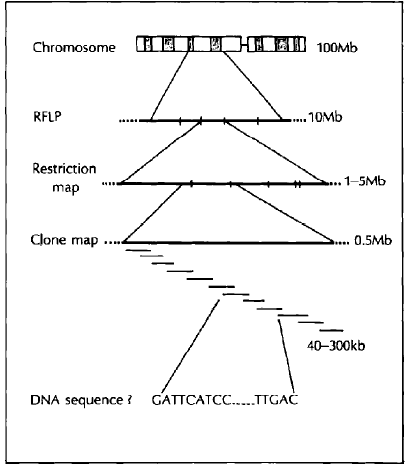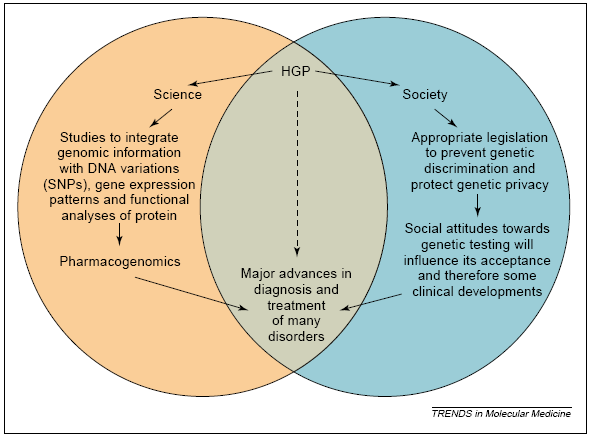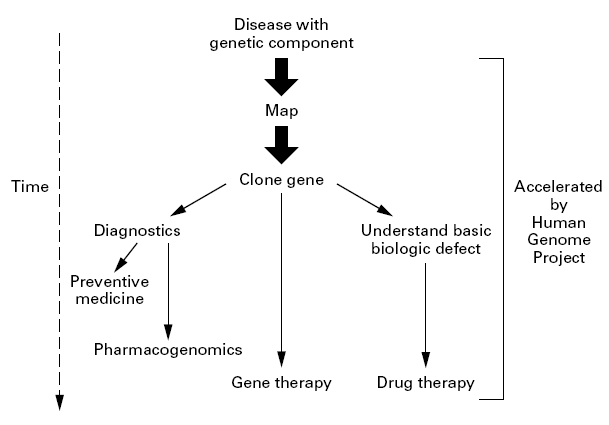The success of science depends on continuous research aimed at upgrading existing knowledge. As such the biological fields of science are undertaking such projects. One such project human genome project (HGP), one of the most important discoveries is aimed at not only identifying and defining all types of human genes numbering 20.000-25.000, as well as isolating the chemical partnering in these cells (See Fig 1). Human genome cells have been found to contain valuable information that can be useful in a number of scientific fields. Such application of knowledge includes in fields such as improved health care by providing better medical therapy as well as helping in finding particular mutation in diseases causing cells.

HGP has gone on for a number of years with concerted efforts to make findings. However, it is in the year 2001 that the first official report was issued by scientists. This reported as seen in Fig 2 describes the much of the basic configuration of the humans genome, which has also provide further knowledge and opportunities for improvements. The report has an initial hypothetical weakness. The report presupposed, hypothetically that human genomes have a higher number of genes than a number of certain known organisms. This initial conclusion has been disapproved by the findings resulting from HGP. A series of studies done after this reports have revealed a number of interesting finding in genetics. They include the findings that human cells have a lower number of genes that initially expected. Actually human genes have a similar number similar number of genes as most of these organisms. Secondly it was also found out that the genome distribution in human cells was oddly arranged: some part of the chromosomal cells. Furthermore, while human proteins code in threes, animal proteins only code one. Furthermore, the human genes have been found to be more complicated than their animal counterparts. Despite their complexity it has been found out that about nucleotide sequences of human genes are similar in all individuals regardless of race. This is in addition to about 1.5 % of all human cells that are involved in encoding of proteins. This means that human males have an increased risk of having cell mutation that their female counterparts (Vargas, 2002).

Scientists in the past have made concerted efforts to study genetics as a means of looking for solutions to a number of solutions in the medical as well in other fields that could manipulate that knowledge. This includes biologists who have made significant gains in identifying and categorising genetic diseases. The results have lead to the classification of about three classes of diseases being classified. Chromosomal aberrations are a class of genetic disorders that result from the alterations of in the configuration of chromosomal cells. This can also result from an alter qualities of theses cells in the human bodies. Another class of genetic diseases is the Multifactorial disorders. This class of disorders is caused by mutations in the allele of a unitary gene. They can also be caused by other factors associated with the surrounding natural environment. This means that the natural environment has the ability to adversely affect the genetic make of organism. The third class of genetic disease is the single gene disorders. Unlike Multifactorial disorders, this class of diseases resulted from the mutations in allele of a single gene. This means that they cannot result from any external environment. As such they are inherited from the parent of the gene. These findings were however recorded before the HGP, which has resulted in yet another class of genetics based disorders. The somatic cell genetic disease has been added as the fourth class of genetically diseases due to the improved knowledge of the structural of the DNA resulting from HGP. This class of genetic diseases are assisted with a number of genetic cases in human being. They are the congenital malformation (acquired through inherence), auto immune process as well as the process of aging in people. Human genome project has also lead to the discovery of the nucleotide polymorphisms (SNPs). SNPs are type of nucleotides that identify the dissimilarities in the progression of the human DNA. They also identify similar individuals with coupled chromosomal cells. These findings have lead to a better understanding of the causes of having a high level of gene based variation in human chromosomal cells. In addition the discoveries of the nucleotide polymorphisms are used to locate any haplotypes that cold be connected to any genes that cause diseases. This is only possible though if a plan of existing SNPs consisting about 30.000 to 500.000 SNPs.
The human genome project has also been advantageous to scientist as it has helped them to identify the amount of human proteins encoded o in the human genomes. This means that scientists have been able to mark the structural make up of these proteins. This mean that information necessary for protein formations will be understood further and as such genetic engineering will be taken a notch higher (Vargas, 2002).
Another significant HGP finding is the microarray technology otherwise popularly known as the gene chips. Gene chips were developed after the unearthing of the numerous proteins contained in the human genome. A gene chip is developed from a high number of DNA progression coded from the human genes. Scientist will thus be able to use the gene chip which will also be paired with a messenger RNA to identify which of the gene chip is active in specific human chromosomal cells. This information that has helped in the development of the gene chip will be useful in the study cancer cells. Thus the future of the cures of cancer looks promising (Collins, 1999)
This means that the knowledge of identifying which particular genomes are active in specific cells are useful in increasing the medical knowledge of diseases contained in disease causing cells. The information will thus be very useful in development of genetic drugs to cure some incurable diseases such as cancer. This it will be useful in the development of the pharmacogenetics approach to health care solutions (Wang et al., 2004).
For a very long period of time biologist as well as other scientists have been making concerted efforts to try and gain a deeper understanding of the history of human evolution. Analysing the human DNA has been one of the means. The disadvantage of these methods is that the DNA analysis can only generate data about the genetic configuration of the human beings as well as the family lineage. HGP has come at time that it will be very useful in helping scientist gain better understanding of the human evolution stages (Collins, 1999).
Forensic science is another field that will greatly benefit from the HGP. The ability of the HGP to identify the dissimilarities of the number of reported airing in the chemical formation the scientists will be able to generate hard evidence from scenes of crime. As such HGP will have been useful in another non biological fields (Salas et al., 2007).
The issue of paternity especially in parenting disputes will be greatly helped by this project. The increased understanding of the human genome will be greatly lead to the improvement of the comparisons between genetic make of individual. As such scientist will be able to use the alleles of the father and if theirs any similarity between those of the father and those of the child then that will be sufficient proof that he is the biological parent (Vargas, 2002).
As previously stated in an earlier part of this paper, HGP will be very useful source of information that will be very helpful to health care provider in developing of genetic drug for previously incurable diseases such as cancer. Other than advancing healthcare provision for these diseases, HGP will be useful in the development of new technological tools for extremely improved rehabilitation of diseases and as such cloning of cells will be useful improved cell biology (See Fig 3). Furthermore the procedure of cloning cell will also enable biologist to revamp and as such help in the modification of diseased cells. This will greatly improve pharmacology. Furthermore it will be useful in developing of better vaccines as it will be useful to genetically modify human genes. To ad to this scientists will generate infection necessary for utilisation by pharmacist in mass development of genetic drugs (Tolstoi, 1999; Vargas, 2002).

Therefore not only will HGP have great benefits in the field of biological research, but also useful in other fields such as forensic science as well as crime scene investigation. This is because other than understanding the chemical make up of genes it also provides clear information about the paring of proteins in these cells. The improved understanding of SNPs will be beneficial to in understanding the disparities between the genetic make up of individuals. This will be more useful in solving paternity issues. Furthermore, the intelligence generated about the genetic coding will help in isolating specific protein functioning in various chromosomal cells. As such it will lead to increased understanding of the structural configuration of the human cell. HGP will also have result to the development of the gene chip which will also be useful in understanding cells related to various diseases as well as in improved knowledge of the evolution history of human beings. The pharmacists will also be benefited by this project as it will help them in producing genetic drugs en mass and as such not only will health care solution be improved but also affordable. HGP has many benefits and there are possibilities for its utilisation with advancement in sciences. As such it cane be said to be a worthy project to undertake